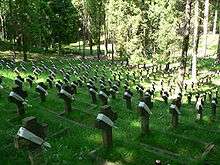Antakalnis Cemetery



Antakalnis Cemetery (Lithuanian: Antakalnio kapinės, Polish: Cmentarz na Antokolu), sometimes referred as Antakalnis Military Cemetery, is an active cemetery in the Antakalnis district of Vilnius, Lithuania. It was established in 1809.
Soldier burrials
12 of the 14 victims of Soviet Army forces' attacks during the January Events of 1991 and the Medininkai Massacre are buried here. Other graves include those of Polish soldiers perished in 1919–20, a memorial of Lithuanian as well as German and Russian soldiers fallen in World War I and Red Army soldiers of World War II (constructed in 1951, rebuilt 1976–84). In 2003, over 3,000 French and other soldiers of the Grande Armée of Napoleon I who took part in the 1812 invasion of Russia were reburied at the cemetery after their bodies were excavated some two years prior from French-dug trenches that were used by the victorious Russians as mass graves due to the frozen state of the ground; French and Lithuanian diplomats participated in the interment ceremony.[1] The remains of 18 more soldiers from the army who were dumped into a different area were reburied in November 2010.[2]
Famous interments
The famous people buried in the Antakalnis Cemetery include:
- Jonas Avyžius (1922–1999), Lithuanian writer
- Algirdas Brazauskas (1932–2010), politician, first president of independent Lithuania, elected in 1993
- Teodor Bujnicki (1907–1944), Polish poet
- Vytautas Edmundas Čekanauskas (1930–2010), Lithuanian architect
- Ričardas Gavelis (1950–2002), Lithuanian writer, playwright, and journalist
- Sigitas Geda (1943–2008), Lithuanian poet, writer, playwright
- Romualdas Granauskas (1939–2014), Lithuanian writer, playwright
- Jurga Ivanauskaitė (1961–2007), Lithuanian writer
- Juozas Kamarauskas (1874–1946), Lithuanian painter
- Vytautas Kernagis (1951–2008), singer and songwriter
- Kostas Kubilinskas (1923–1962), Lithuanian poet
- Jurgis Kunčinas (1947–2002), Lithuanian poet, writer
- Justinas Marcinkevičius (1930–2011), poet, writer and playwright
- Janina Miščiukaitė-Brazaitienė (1949–2008), singer
- Danas Pozniakas (1939–2005), Lithuanian boxer, the first Olympic champion from Lithuania
- Ieva Simonaitytė (1897–1978), Lithuanian writer
- Vytautas Šapranauskas (1958–2013), theater and film actor, television presenter, humorist
- Paulius Širvys (1920–1979), Lithuanian poet, writer, journalist
- Anton Schmid (1900–1942), German sergeant, Righteous among the Nations
- Antanas Venclova (1906–1979), Lithuanian and Soviet writer and politician
- Norbertas Vėlius (1938–1996), Lithuanian folklorist
- Justinas Vienožinskis (1886–1960), Lithuanian painter
- Marian Zdziechowski (1861–1938), Polish philosopher and historian
- Stasys Krasauskas (1929-1977), Lithuanian painter and graphic artist
Saulės Cemetery

The Saulės Cemetery is another cemetery in Antakalnis sometimes referred to as Antakalnis Cemetery. It is the old parish cemetery of St. Peter and St. Paul Church, established in 1830 and is the place of rest of many noble Poles and Lithuanians.
Famous people buried here include members of Ogiński and Zawisza noble families, Lithuanian cultural figure Danielius Alseika (1881–1936), Lithuanian linguist Jonas Kazlauskas (1930–1970), Lithuanian cultural figure Petras Kraujalis (1882–1933), sculptor-modernist Teodoras Valaitis (1934–1974), Józef Zawadzki (1781–1838), the editor of the first poems of Adam Mickiewicz, Wincenta Zawadzka (1824–1894), author of the first Lithuanian cookbook, printed in Polish language "Kucharka Litewska" ("Lithuanian cook").
See also
References
- ↑ "Napoleon's Soldiers Finally Get a Burial". The Moscow Times. 2 June 2003.
- ↑ "Napoleon's defeated soldiers buried in Lithuania". BBC News. 29 November 2010.
External links
| Wikimedia Commons has media related to Antakalnis Cemetery. |
Coordinates: 54°41′53″N 25°19′16″E / 54.698°N 25.321°E